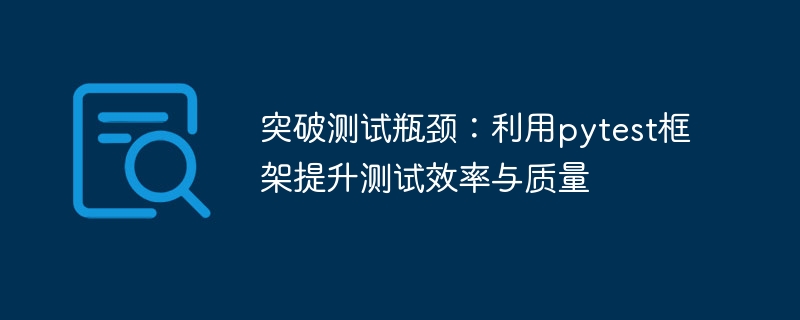Home >Backend Development >Python Tutorial >Solve testing bottlenecks and improve testing efficiency and quality by using the pytest framework
Solve testing bottlenecks and improve testing efficiency and quality by using the pytest framework
- PHPzOriginal
- 2024-01-04 10:26:40943browse

Breaking through the testing bottleneck: using the pytest framework to improve testing efficiency and quality
Introduction:
In the software development process, testing is an important part of ensuring software quality. However, traditional testing methods are often inefficient and difficult to complete comprehensive testing within a limited time. In order to improve testing efficiency and quality, we can use the pytest framework for automated testing.
1. Introduction to pytest framework
pytest is a powerful and easy-to-use Python testing framework. It supports various types of testing, including unit testing, integration testing, and functional testing. pytest provides concise syntax and a rich plug-in system, making writing test cases easier and more flexible.
2. Simple example: unit test
Let’s first look at a simple unit test example to help understand the basic usage of pytest.
test_example.py
def add(x, y):
return x + y
def test_add():
assert add(1, 2) == 3 assert add(10, 20) == 30
In the above code, we define Create an add function and write a test_add test case. Running this test case using the pytest framework is very simple, just enter the following command in the terminal:
pytest test_example.py
The running results will show the execution of the test case, if all assertions passed , the test passes. If any assertion fails, the test fails.
3. Parameterized testing
A powerful function of pytest is parameterized testing. This testing method can greatly reduce the workload of writing duplicate code while improving test coverage. The following example shows how to use the @pytest.mark.parametrize decorator to define a parameterized test:
test_parameterized.py
import pytest
def multiply(x, y ):
return x * y
@pytest.mark.parametrize("x, y, expected", [(2, 3, 6), (5, 5, 25), (10, 0, 0)])
def test_multiply(x, y, expected):
assert multiply(x, y) == expected
In this example, we define a multiply function for multiplying two numbers. Using the @pytest.mark.parametrize decorator, we can define multiple parameter combinations and use them in a test case. Run the above test case, and pytest will automatically combine all parameters and execute the tests in sequence.
4. Use plug-ins to extend functions
pytest provides a rich plug-in system that can be used to extend its functions. The following are some commonly used plug-in examples:
- pytest-cov: used for code coverage testing, which can count the number of lines of code covered by test cases.
- pytest-html: Generate beautiful HTML test reports, including test case execution results and coverage statistics.
- pytest-mock: used to simulate dependent objects in tests to facilitate writing test cases independent of the external environment.
By adding these plug-ins, we can better maintain the test code and obtain more detailed test reports and statistics.
Conclusion:
Using the pytest framework, we can greatly improve testing efficiency and quality. Through concise syntax and rich plug-in system, we can easily write various test cases and flexibly respond to different test scenarios. I believe that after we apply the pytest framework to testing, we will take an important step in testing efficiency and quality.
The above is the detailed content of Solve testing bottlenecks and improve testing efficiency and quality by using the pytest framework. For more information, please follow other related articles on the PHP Chinese website!

